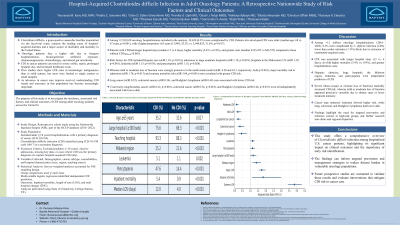Monday Poster Session
Category: Infections and Microbiome
P3416 - Hospital-Acquired Clostridioides difficile Infection in Adult Oncology Patients: A Retrospective Nationwide Study of Risk Factors and Clinical Outcomes
Monday, October 27, 2025
10:30 AM - 4:00 PM PDT
Location: Exhibit Hall

Has Audio

Ihunanya M. Kanu, MBBS, MPH
Baptist Memorial Hospital-Golden Triangle
Columbus, MS
Presenting Author(s)
Ihunanya M. Kanu, MBBS, MPH1, Fidelis E. Uwumiro, MD2, Lilian Odion-Omonhimin, MD3, Frankly G. Ojeh, MD4, Oluchi J. Nduji, MBBS5, Adetayo Ajiboye, MD6, Okatta Alexander, MD7, Christian Offiah, MBBS8, Ifunanya R. Ekeocha, MD9, Ifeyinwa Ezeudu, MD10, Somto Ojukwu, MBBS11, Sorrentina V. Awala, MD12, Elijah Ibibia, MBBS13, Ifeoluwa Falade, MBBS14
1Baptist Memorial Hospital-Golden Triangle, Columbus, MS; 2Southern Regional Medical Center · Riverdale, Georgia, USA, Riverdale, GA; 3University of Benin · Benin, NGA, Benin, Edo, Nigeria; 4Ebonyi state university. · Abakaliki , NGA, Abakaliki, Ebonyi, Nigeria; 5Abia State University Uturu · Okigwe, NGA, Okigwe, Abia, Nigeria; 6Birmingham and solihull NHS · Birmingham, GBR, Birmingham, England, United Kingdom; 7Department of Internal Medicine Imo state University Teaching Hospital · Orlu, NGA, Orlu, Imo, Nigeria; 8Chukwuemeka Odumegwu Ojukwu University College of Medical Sciences · Awka, NGA, Awka, Anambra, Nigeria; 9Nnamdi Azikiwe University Teaching Hospital · Nnewi, NGA, Nnewi, Anambra, Nigeria; 10Autism Support and Services · Alberta, CA, Alberta, CA; 11Ebonyi State University Teaching Hospital · Abakaliki, NGA, Abakaliki, Ebonyi, Nigeria; 12Kursk State Medical University · Kursk, RUS, Kursk, Kursk, Russia; 13Nnamdi Azikiwe University College of Health Sciences · Nnewi, NGA, Nnewi, Anambra, Nigeria; 14Mersey and West Lancashire Teaching Hospitals · Boston , GBR, Boston, England, United Kingdom
Introduction: Clostridium difficile, a gram-positive anaerobic bacillus transmitted via the fecal-oral route, remains the leading cause of healthcare-associated infections. Emerging evidence highlights a disproportionately higher risk of C. difficile infection (CDI) among cancer patients, especially those with hematologic malignancies, due to their increased exposure to known risk factors. This study investigates the incidence, associated risk factors, and clinical outcomes of CDI among adult oncology patients across the United States.
Methods: A retrospective cohort analysis was conducted using hospital data from the Nationwide Inpatient Sample (NIS) database from 2016-2022. Hospitalized adult cancer patients were identified using ICD-10 codes. Baseline sociodemographic characteristics were compared between hospitalizations of cancer patients with and without CDI. Multivariable logistic regression analysis was used to identify factors associated with CDI.
Results: Among 12,539,620 oncology hospitalizations included in the analysis, 39,620 (0.3%) were complicated by CDI. Patients who developed CDI were older (median age: 68 vs. 67 years, p< 0.001), with a higher proportion ≥65 years (13,948; 35.2% vs. 3,949,825; 31.6%; p=0.017). Patients with CDI had longer hospital stays (median 12 vs 4 days), higher mortality (5.4% vs 0.9%), and greater costs (median $123,935 vs $42,555) compared to those without CDI (pfor all< 0.001). Risk factors for CDI included Hispanic race (aOR 1.83; p=0.014), admission to large academic hospitals (aOR 1.19; p=0.039), hospitals in the Midwestern US (aOR 1.39; p=0.001), leukemia (aOR 1.15; p=0.019), and pancytopenia (aOR 1.15; p=0.028). Whereas mild or moderate loss of function were strongly protective in the multivariate model (aOR: 0.20 and 0.13, respectively; both p< 0.001), major mortality risk at admission (aOR 1.74, p=0.013) and extreme mortality risk (aOR 3.84, p=0.001) were correlated with greater CDI risk. Lung cancer (aOR 0.22), colorectal cancer (aOR 0.34), and Hodgkin's lymphoma (aOR 0.44) were associated with lower CDI risk. Conversely, lung/bronchus cancer (aOR 0.22, p< 0.001), colorectal cancer (aOR 0.34, p=0.018), and Hodgkin’s lymphoma (aOR 0.44, p=0.031) were all independently associated with lower odds.
Discussion: CDI is associated with substantial morbidity, mortality, and healthcare costs in hospitalized cancer patients. Targeted prevention strategies are needed for high-risk groups, including those with leukemia and critical illness.
Disclosures:
Ihunanya M. Kanu, MBBS, MPH1, Fidelis E. Uwumiro, MD2, Lilian Odion-Omonhimin, MD3, Frankly G. Ojeh, MD4, Oluchi J. Nduji, MBBS5, Adetayo Ajiboye, MD6, Okatta Alexander, MD7, Christian Offiah, MBBS8, Ifunanya R. Ekeocha, MD9, Ifeyinwa Ezeudu, MD10, Somto Ojukwu, MBBS11, Sorrentina V. Awala, MD12, Elijah Ibibia, MBBS13, Ifeoluwa Falade, MBBS14. P3416 - Hospital-Acquired <i>Clostridioides difficile</i> Infection in Adult Oncology Patients: A Retrospective Nationwide Study of Risk Factors and Clinical Outcomes, ACG 2025 Annual Scientific Meeting Abstracts. Phoenix, AZ: American College of Gastroenterology.
1Baptist Memorial Hospital-Golden Triangle, Columbus, MS; 2Southern Regional Medical Center · Riverdale, Georgia, USA, Riverdale, GA; 3University of Benin · Benin, NGA, Benin, Edo, Nigeria; 4Ebonyi state university. · Abakaliki , NGA, Abakaliki, Ebonyi, Nigeria; 5Abia State University Uturu · Okigwe, NGA, Okigwe, Abia, Nigeria; 6Birmingham and solihull NHS · Birmingham, GBR, Birmingham, England, United Kingdom; 7Department of Internal Medicine Imo state University Teaching Hospital · Orlu, NGA, Orlu, Imo, Nigeria; 8Chukwuemeka Odumegwu Ojukwu University College of Medical Sciences · Awka, NGA, Awka, Anambra, Nigeria; 9Nnamdi Azikiwe University Teaching Hospital · Nnewi, NGA, Nnewi, Anambra, Nigeria; 10Autism Support and Services · Alberta, CA, Alberta, CA; 11Ebonyi State University Teaching Hospital · Abakaliki, NGA, Abakaliki, Ebonyi, Nigeria; 12Kursk State Medical University · Kursk, RUS, Kursk, Kursk, Russia; 13Nnamdi Azikiwe University College of Health Sciences · Nnewi, NGA, Nnewi, Anambra, Nigeria; 14Mersey and West Lancashire Teaching Hospitals · Boston , GBR, Boston, England, United Kingdom
Introduction: Clostridium difficile, a gram-positive anaerobic bacillus transmitted via the fecal-oral route, remains the leading cause of healthcare-associated infections. Emerging evidence highlights a disproportionately higher risk of C. difficile infection (CDI) among cancer patients, especially those with hematologic malignancies, due to their increased exposure to known risk factors. This study investigates the incidence, associated risk factors, and clinical outcomes of CDI among adult oncology patients across the United States.
Methods: A retrospective cohort analysis was conducted using hospital data from the Nationwide Inpatient Sample (NIS) database from 2016-2022. Hospitalized adult cancer patients were identified using ICD-10 codes. Baseline sociodemographic characteristics were compared between hospitalizations of cancer patients with and without CDI. Multivariable logistic regression analysis was used to identify factors associated with CDI.
Results: Among 12,539,620 oncology hospitalizations included in the analysis, 39,620 (0.3%) were complicated by CDI. Patients who developed CDI were older (median age: 68 vs. 67 years, p< 0.001), with a higher proportion ≥65 years (13,948; 35.2% vs. 3,949,825; 31.6%; p=0.017). Patients with CDI had longer hospital stays (median 12 vs 4 days), higher mortality (5.4% vs 0.9%), and greater costs (median $123,935 vs $42,555) compared to those without CDI (pfor all< 0.001). Risk factors for CDI included Hispanic race (aOR 1.83; p=0.014), admission to large academic hospitals (aOR 1.19; p=0.039), hospitals in the Midwestern US (aOR 1.39; p=0.001), leukemia (aOR 1.15; p=0.019), and pancytopenia (aOR 1.15; p=0.028). Whereas mild or moderate loss of function were strongly protective in the multivariate model (aOR: 0.20 and 0.13, respectively; both p< 0.001), major mortality risk at admission (aOR 1.74, p=0.013) and extreme mortality risk (aOR 3.84, p=0.001) were correlated with greater CDI risk. Lung cancer (aOR 0.22), colorectal cancer (aOR 0.34), and Hodgkin's lymphoma (aOR 0.44) were associated with lower CDI risk. Conversely, lung/bronchus cancer (aOR 0.22, p< 0.001), colorectal cancer (aOR 0.34, p=0.018), and Hodgkin’s lymphoma (aOR 0.44, p=0.031) were all independently associated with lower odds.
Discussion: CDI is associated with substantial morbidity, mortality, and healthcare costs in hospitalized cancer patients. Targeted prevention strategies are needed for high-risk groups, including those with leukemia and critical illness.
Disclosures:
Ihunanya Kanu indicated no relevant financial relationships.
Fidelis Uwumiro indicated no relevant financial relationships.
Lilian Odion-Omonhimin indicated no relevant financial relationships.
Frankly Ojeh indicated no relevant financial relationships.
Oluchi Nduji indicated no relevant financial relationships.
Adetayo Ajiboye indicated no relevant financial relationships.
Okatta Alexander indicated no relevant financial relationships.
Christian Offiah indicated no relevant financial relationships.
Ifunanya Ekeocha indicated no relevant financial relationships.
Ifeyinwa Ezeudu indicated no relevant financial relationships.
Somto Ojukwu indicated no relevant financial relationships.
Sorrentina Awala indicated no relevant financial relationships.
Elijah Ibibia indicated no relevant financial relationships.
Ifeoluwa Falade indicated no relevant financial relationships.
Ihunanya M. Kanu, MBBS, MPH1, Fidelis E. Uwumiro, MD2, Lilian Odion-Omonhimin, MD3, Frankly G. Ojeh, MD4, Oluchi J. Nduji, MBBS5, Adetayo Ajiboye, MD6, Okatta Alexander, MD7, Christian Offiah, MBBS8, Ifunanya R. Ekeocha, MD9, Ifeyinwa Ezeudu, MD10, Somto Ojukwu, MBBS11, Sorrentina V. Awala, MD12, Elijah Ibibia, MBBS13, Ifeoluwa Falade, MBBS14. P3416 - Hospital-Acquired <i>Clostridioides difficile</i> Infection in Adult Oncology Patients: A Retrospective Nationwide Study of Risk Factors and Clinical Outcomes, ACG 2025 Annual Scientific Meeting Abstracts. Phoenix, AZ: American College of Gastroenterology.
